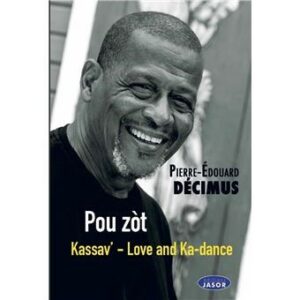Memory of Zouk

The origins of zouk
Extract from Dominique's magazine
Pierre-Edouard Décimus
Like Creole, which is a blend of different languages, Zouk is a music whose many influences are drawn from the diversity of Caribbean music.
Since its creation in 1974, it has remained the most popular music in the West Indies. Today, it is the glue that holds the West Indian identity together.
What's more, it typifies the emancipation of an entire people, who have reinvented their own music.
But where does the word 'zouk' come from?
There are several contradictory versions about the origin of the word "zouk" and when it was actually created.
The Petit Robert dictionary states that the term zouk "highly rhythmic dance music from the Lesser Antilles" only appeared in the 1980s.
However, the famous Martinican percussionist Henri Guedon points out that in the 1960s, the word "zouk" referred to dance venues reserved for the poorest people.
Some say the word has Haitian origins: long before the great zouk songs, on one of the albums by the Haitian group Skasha, there was a track called "souke". Others say that the word zouk comes from a contraction of the word "mazouke", which refers to the "danse mazurka.
While the etymological origin of the word 'zouk' remains a mystery to this day, the same cannot be said of its musical origins. Most people agree on its origin.
The origins of zouk music: Kassav' (La cassave, the cassava flour cake from which the famous group takes its name).
Talking about the birth of zouk is like talking about the creation of the group Kassav'. For most West Indians, it was this group that laid the foundations and gave Zouk its musical colour.
The history of zouk began in 1979, when two key figures in West Indian music met. Pierre Édouard Décimus, a musician in a dance band called "les vikings de la Guadeloupe", and Freddy Marshall, a talent scout, met with the aim of breathing new life into local music. At the time, the most popular rhythms were the Gwo Ka, La Biguine, the Compass and the "vidés" music, with its lively, upbeat rhythms, played during Carnival in the West Indies.
An idea of genius
It was while listening to this popular carnival music that Pierre Édouard Décimus had the idea of adapting it to the latest musical techniques. Using his tape recorder, he began recording the sounds played in the "vidés", which he would then rework in his studio in Grand Camp, to create new sounds inspired by the musical atmosphere of carnival. It was at this point that he met Freddy Marshall, who would bring his musical touch to the project.
Birth of the group Kassav'
The two men later met Jacob Desvarieux, an established studio guitarist. Shortly afterwards, George Decimus, the bassist and brother of Pierre Édouard Décimus, joined them. The group Kassav' was born.
The following year, the group released an album called Love and Ka Danse. A new musical genre was born: zouk. Its harmonic base is founded on two or three seemingly simple chords, but reveals its richness in a rhythmic overlay (percussion, guitar riff, brass section and chorus). Very quickly, the appearance of new sounds, especially bass, keyboards and brass, gives this music a modern and above all festive air, making it lively and danceable.
In the 1980s, the group enjoyed dazzling success. Soon, the band was complete with the arrival of Jocelyne Béroard, Jean Philippe Marthély, Patrick St Eloi and Jean Claude Naimro on keyboards. The group was thus complete, playing music marked by the diversity of its members. The collaboration between these artists gave rise to a style that drew on multiple influences, was open and constituted a musical approach in its own right, at odds with the West Indian music of the time. It was this approach that made the group such a success, both inside and outside its native region.
Other musicians followed Kassav's example and brought this music to the four corners of the globe.
Zouk on the rise
This West Indian music reached its peak in the 80s and 90s: in 1989, Kassav' was awarded a platinum disc for selling a million records worldwide. Zouk was internationally famous! Other songs that left their mark on the French music scene included Francky Vincent's "Fruits de la passion" and Zouk Machine's famous "Mal'don", which stayed at number one in the French Top 50 for fourteen consecutive weeks.
However, zouk, which was in full swing, was to undergo further transformations, enabling it to expand its audience even further.
The different variations of Zouk Zouk is a musical movement that still generates new trends today, to which we naturally give new names, but which are all born of Zouk.
Zouk love
From the original zouk, we very quickly moved into zouk love. The change in tempo is characteristic of this new zouk. Over the years, the tempo has slowed down. Today, there's a real craze for zouk love. It's a special kind of zouk, danced mainly by young people. It's the equivalent of the French slow dance, with a swaying, languorous edge. This innovative dance, full of sensuality, contrasts with poor lyrics that deal tirelessly with similar themes: most often love, and the relationship between men and women.
Rn'B zouk
Influenced by the United States, artists from the French West Indies have long been experimenting with American musical styles. So it was only natural to give zouk an Rn'B twist. Jean Michel Rotin was one of the first to launch this new musical trend with his hit "lè ou love". He also stood out for the way he danced the break to his own zouk music. Since then, many artists have taken an interest in this new variation of zouk, taking advantage of the RN'B and Rap trends of the 90s.
Since then, the style has become codified. In the studio, drum machines replace drummers, lyrics sung in Creole are punctuated by a few English phrases, and there are many 'rapped' passages. All this is built up without ever losing the original rhythm of zouk, which you'd almost forget in the face of the profusion of added elements.
Ragga-zouk
Ragamuffin is one of those new trends that immediately appealed to young people. Today, the fashion is for méa blend of raggamuffin and zouk. The artists Don Miguel and Daddy Harry were the first to launch this movement in the West Indies.
A certain nostalgia for zouk
Despite all the variations on zouk today, "early zouk" still appeals to successive generations. Hardly a week goes by in the West Indies without a party being organised for fans of "retro zouk", which has never gone out of fashion and continues to convey all the warmth of the West Indies.
Zouk superstar
Over the past twenty years or so, zouk has become a musical benchmark in the French West Indies and the rest of the world. A blend of different musical styles, it has been adapted in all sorts of forms and taken up in different countries. Reunion, Gabon, South America and many others have adopted zouk and revisited it. Zouk is so well known that today in the West Indies, people say "we're going to zouk".
EXTRACT from the book by Pierre-Edouard Décimus

A Zouk Story
The music that Kassav' created became known as "zouk" through the public: a festive, danceable sound.
Très vite, this word is aKassav''s style and music, then the group adopted it and imposed it worldwide, giving it its letters of nobility.
The usual meaning of 'zouk' was well known to me, as I had been visiting Martinique regularly since 1967 with Les Vikings de la Guadeloupe. Former workers from the Larenty factory living on the 'habitation' had had the opportunity to explain this 'custom' to me, which dates back to the post-war period.
In those days, after receiving their pay, the men used to meet every fortnight a stone's throw from the sugar factory, in a sort of stall with a lean-to made of corrugated iron, planks and coconut branches.
They were seated in small groups, some for a game of dominoes or sèbi (a dice game), others to discuss various things over a bottle of wine and some victuals, while singers and occasional musicians enlivened the atmosphere.
At the time, "Zouk" referred to an atmosphere of gambling and drinking, reserved for men. From 1960 onwards, Martiniquans aged between 18 and 35 began to refer to popular dance evenings organised with friends as "zouk" (those aged between 35 and 40 attended the more common Saturday balls and the prestigious "grand bals" such as the Club Colonial ball in Fort-de-France or the Solidarité Scolaire ball in Pointe-a-Pitre, which were held once a year).
In 1984, knowing that "zouk" meant "surboum", Patrick Saint-Eloi composed the song "Zouké". When he exclaimed "Ça, c'est le zouk!" (That's zouk!), he was inviting the audience to join in the Kassav' concert in zouk mode, as if it were an evening dedicated to partying with friends.
From 1985 onwards, the public began to associate "zouk" with Kassav®.
- in a sense derived from the original term - as well as music from the "Kassav' galaxy", which then occupied more than 90% of the playlists most played at "zouk" evenings, discos and family parties, until 1994.
But the name conceals other surprises, which (re)sound like it, but don't have the same meaning - another consonance story that goes back to the origins of Kassav' :
Although it refers to a Caribbean cake, "Kassav'" has been a musical group since 1985.
"Zouc", "zouk", "zouké", "zouk-la", "Le zouk", "Zouki". There can be no confusion between these terms, whether they are related or not. This diversity is the very essence of our beautiful Creole language, full of subtlety and vitality. I'd like to add this little anecdote: one Thursday evening, on television, the play Jeux de massacre by Eugène Ionesco, filmed in 1970 at the Montparnasse theatre, was shown again;
Media




